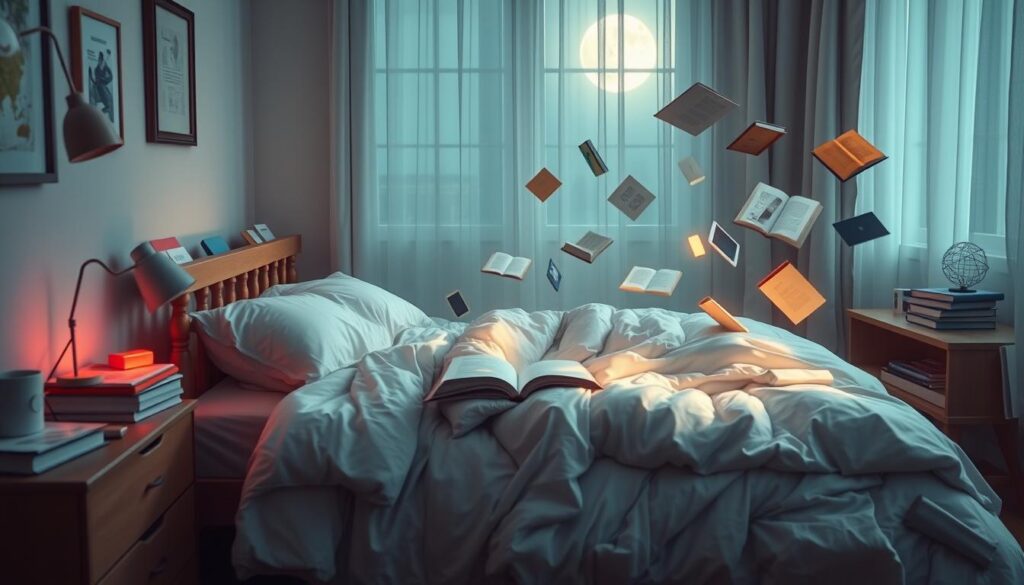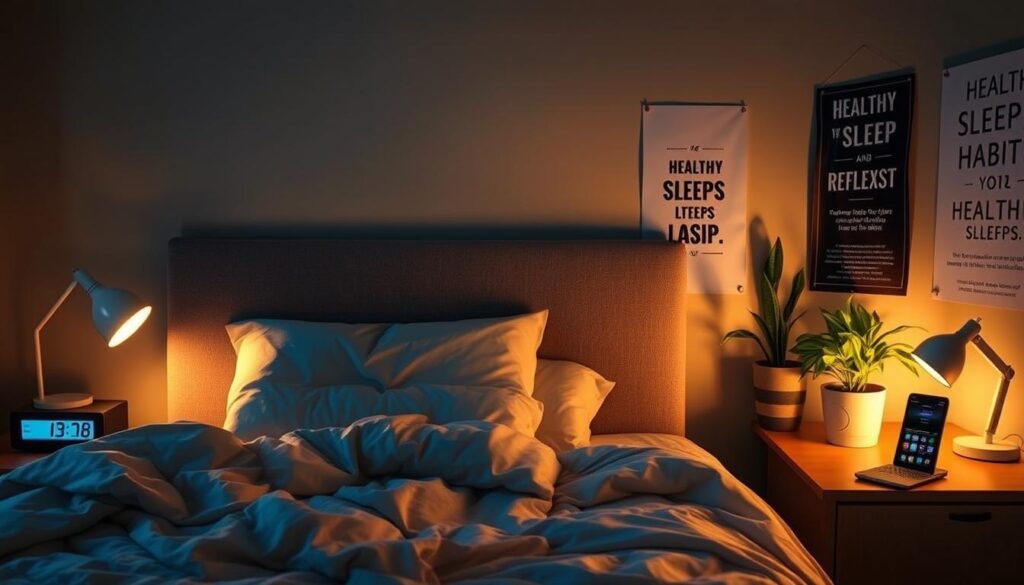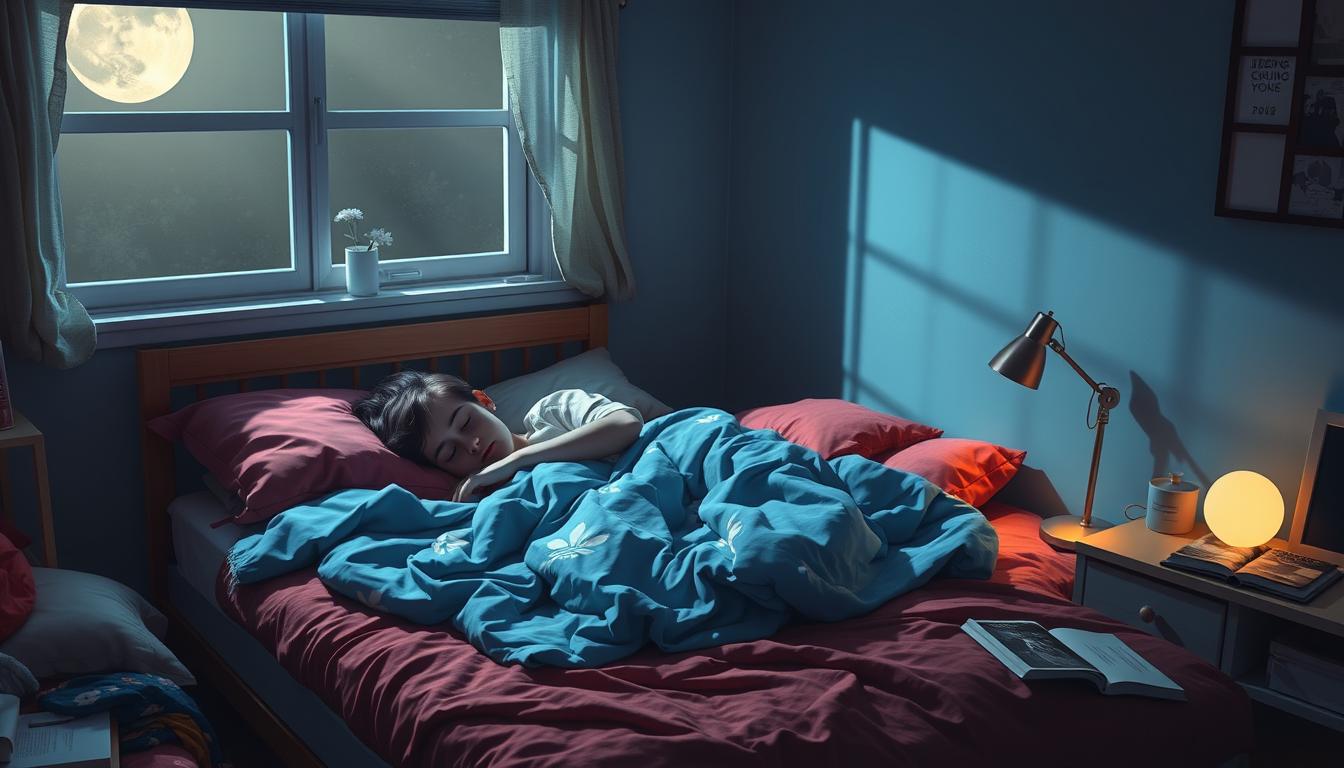As a teenager, I’ve learned how key sleep is for our health and school success. It’s easy to overlook the need for a good night’s sleep with all the demands we face. But studies show that enough sleep is essential for us, affecting our thinking, feelings, and health.
In this article, I’ll dive into why sleep patterns change in teens, the harm of not sleeping enough, and how to make our sleep space perfect. By grasping the value of sleep, we can make better choices and reach our highest abilities.
Key Takeaways
- Teenagers need more sleep than adults because of changes in puberty.
- Not getting enough sleep can hurt our school work, memory, and solving problems.
- Using digital devices and blue light before bed can mess up our sleep cycle.
- Having a cozy and quiet sleep area is key for good rest.
- Valuing sleep helps us manage our feelings, stress, and overall health better.
Understanding Teen Sleep Patterns and Biology
Teenage sleep habits are complex and often misunderstood. To understand their importance, we need to explore their unique sleep cycles and biological needs. This section aims to explain the fascinating connection between teenage sleep patterns and the physiological factors that shape them.
The Science Behind Teenage Sleep Cycles
As teens go through puberty, their sleep-wake cycles change. Their internal clock, or circadian rhythm, shifts due to hormonal changes. This makes teens feel more alert and awake later in the evening. It’s a natural change, not just a choice.
Why Teens Need More Sleep Than Adults
Teens need more sleep than adults. Their brains are developing, and sleep is key to this process. They need 8-10 hours of sleep each night for their brains, emotions, and health to thrive.
Hormones and Sleep: The Complex Connection
Hormonal changes in puberty affect teen sleep patterns. Melatonin, which controls sleep, is released later in teens. This makes them stay up and sleep in later. Other hormones, like growth hormone and cortisol, also play a role in disrupting their sleep-wake balance.
Understanding the science behind teen sleep habits is key. It helps us see why quality sleep is so important for them. By knowing the biological factors, we can support their sleep needs better (link).
| Optimal Sleep Duration for Teens | Consequences of Sleep Deprivation in Teens |
|---|---|
| 8-10 hours per night |
|
“The timing of the sleep-wake cycle in adolescents is biologically determined, not simply a matter of choice or poor sleep habits.”
– Dr. Mary Carskadon, sleep expert and professor at Brown University
Sleep Well, Succeed Well: The Importance of Sleep for Teens
As teenagers, getting enough sleep is key to our success and well-being. Good sleep boosts our grades, health, and mood. On the other hand, not enough sleep can harm us a lot.
Good sleep helps our brains work better. It helps us remember things, think clearly, and solve problems. Teens who sleep well do better in school and are more creative.
- Improved memory and learning
- Enhanced concentration and problem-solving skills
- Increased academic performance and higher grades
Good sleep also keeps us physically and emotionally strong. It helps our hormones, immune system, and weight. Teens who sleep well feel better, are less anxious, and happier.
| Benefits of Adequate Sleep | Consequences of Poor Sleep |
|---|---|
|
|
By making sleep a priority, teens can reach their full mental and physical abilities. This sets them up for academic success, physical well-being, and emotional resilience.
“Sleep is the foundation of a teenager’s health and success. By ensuring adequate sleep, we can empower our teens to thrive in all aspects of their lives.”
The Impact of Sleep Deprivation on Academic Performance
Getting enough sleep is key for doing well in school, but many teens don’t get enough. Research links sleep quality to better memory, learning, focus, and problem-solving. These are all important for school success.
Memory and Learning During Sleep
The brain sorts out memories and information learned during the day while we sleep. Not getting enough sleep messes with this process. It makes it hard to remember new things and use them in class.
Concentration and Problem-Solving Skills
It’s hard for teens who don’t sleep well to stay focused in class. Sleep deprivation in adolescents also hurts their ability to solve complex problems and think clearly. These skills are vital for doing well in school.
Grade Correlation with Sleep Quality
Studies from UCLA and Stanford show a strong link between academic performance and sleep. Students who sleep well usually have better grades than those who don’t.
| Sleep Duration | Average GPA |
|---|---|
| 8-10 hours per night | 3.5 |
| 6-8 hours per night | 3.2 |
| Less than 6 hours per night | 2.9 |
The data shows how important academic performance and sleep are for teens. Getting quality sleep can really help them do better in school.

“Sleep is the foundation for learning and memory. Without adequate sleep, the brain simply cannot function optimally.”
Digital Devices and Sleep: Finding the Right Balance
In today’s world, digital devices affect teen sleep a lot. Smartphones, tablets, and computers give off blue light. This light can mess with teens’ sleep patterns, making it tough to fall and stay asleep. Using devices late at night can also hurt sleep quality and quantity.
This can lead to problems in school and overall health. To keep sleep healthy, teens need to balance tech use with rest. The American Academy of Sleep Medicine says to avoid screens for an hour before bed. This helps avoid blue light’s effect on sleep.
Creating a bedtime routine without screens can help teens relax better. This can improve sleep quality and reduce the consequences of poor sleep.
- Limit screen time to no more than two hours per day, in the evenings.
- Don’t use digital devices in the bedroom. Instead, choose relaxing activities before bed.
- Use night mode or blue light-blocking features on devices to lessen blue light’s impact.
- Encourage regular exercise and outdoor activities during the day to help sleep better at night.
By following these tips, teens can find a healthy balance between tech and sleep. This supports their school success, mental health, and overall well-being.
“The key to a good night’s sleep is not just the quantity, but the quality. Balancing digital devices with healthy sleep habits can make all the difference.”

| Device Usage | Impact on Teen Sleep | Recommended Action |
|---|---|---|
| Smartphone/Tablet before bed | Disrupts natural sleep-wake cycle, reduces sleep quality | Avoid using devices for at least 1 hour before bedtime |
| TV in the bedroom | Stimulates the brain, making it harder to fall asleep | Keep the bedroom screen-free and use the bed only for sleep |
| Late-night gaming/social media | Delays sleep onset, reduces total sleep time | Set device curfews and establish a consistent bedtime routine |
Creating the Perfect Sleep Environment for Teens
As a teenager, getting enough sleep is key for doing well in school and feeling good. A great sleep environment is important. This includes things like temperature, lighting, noise, and bedding. These factors can help teens sleep better.
Temperature and Lighting Considerations
The ideal sleep space for teens is cool, dark, and quiet. The room should be between 65°F and 70°F for better sleep. Blackout curtains or an eye mask can block light. Soft, indirect light is good for before bed.
Noise Control and Sound Management
Keeping noise down is vital for a good sleep space. Avoid TVs, computers, and phones in the bedroom. They can mess with sleep. Use a white noise machine or earplugs to block out sounds.
Bedding and Comfort Essentials
The right bedding and mattress are important for sleep. Choose a comfy, supportive mattress and breathable sheets. Pillows that support the neck and spine are also key. Add soft, cozy items like a plush comforter for a relaxing sleep space.
By focusing on these sleep hygiene tips, teens can make a sleep space that helps them sleep well. This supports their school work and overall health.
| Sleep Environment Factors | Recommended Settings |
|---|---|
| Temperature | 65°F – 70°F |
| Lighting | Dark, with soft, indirect lighting |
| Noise | Quiet, with use of white noise machines or earplugs |
| Bedding | Comfortable, supportive mattress and breathable sheets |
“Creating a sleep-friendly environment is essential for teens to get the rest they need to thrive. By focusing on factors like temperature, lighting, and bedding, you can help your teen establish healthy sleep routines and improve their overall well-being.”
– Dr. Emma Roth, Sleep Specialist
Mental Health Benefits of Quality Sleep
As a teenager, getting enough sleep is key for your mind and body. It helps you manage stress, control your emotions, and lowers the chance of depression.
Stress Management Through Better Sleep
Good sleep makes you stronger against daily stress. It keeps your cortisol levels in check, helping you stay emotionally balanced. By sleeping well, you can face life’s challenges more confidently.
Emotional Regulation and Rest
Enough sleep is essential for emotional control. It lets your brain process the day’s feelings, keeping your mood stable. Quality sleep greatly improves your emotional health.
Depression Prevention and Sleep Quality
Poor sleep can lead to depression in teens. Lack of sleep messes with mood-regulating chemicals in your brain. So, getting enough sleep is a smart way to protect your mental health.



